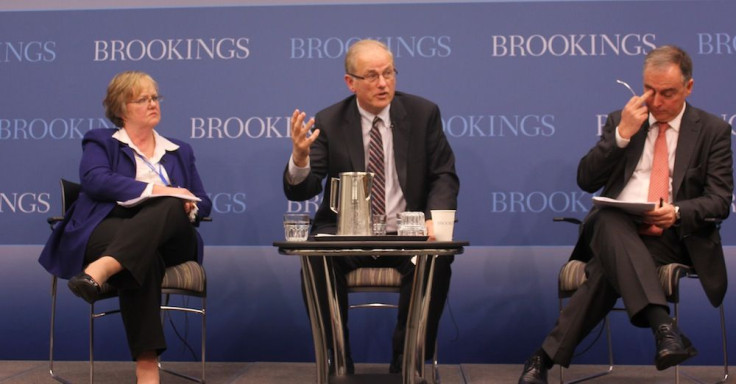The Poison Pill: Assad's Survival Strategy Is To Hang On As Long As Possible

Anyone hoping and dreaming that the Syrian Civil War, which has been raging for close to two years now, might have an end in sight, know that President Bashar al-Assad has other plans. According to former Ambassador Frederic Hof, an administration special adviser for the transition in Syria, Assad's game plan now is to simply hang on, by any means necessary, for as long as he can.
"If I were to boil down the strategy, it would be this," Hof said in an address Monday at the Brookings Institute in Washington, D.C. "Assad is hoping that over time, the extremist elements among the armed opposition will come to dominate the armed opposition, such that this will become a fight between the Syrian regime and al Qaeda."
Such an outcome could render Assad looking like the good guy; his continued rule would, he reasons, suddenly become a palatable alternative to Syria falling into the hands of the world's largest terror network.
"The key to this is hold onto Damascus," Hof said. "That's why there's been such an upsurge in fighting in Damascus."
The proof, Hof said, is in the speech Assad gave a few weeks ago at the Damascus Opera house. "That was basically a reaffirmation of this strategy," Hof said. "Assad was telling his followers, 'Don't worry about the family [the Assads]. We are here for the duration, we will fight this out.'"
Further proof, Hof said, was in the increasingly "sectarian flavor" of the violence. The conspicuous presence among the opposition of Jabat al-Nusra, an Islamist group from Iraq that is affiliated with al Qaeda and recently classified as a foreign terrorist organization by the U.S. State Department, helps Assad make his case. This, along with aid from Iran, makes it easier and easier for Assad to turn to his own Alawite community at least, and imply that he is the only barrier standing between them and genocide.
With between 2 millon and 4 million internally displaced Syrians, and 2,000 to 3,000 refugees flowing over the borders every day into the neighboring countries, it's hard to imagine how this war could get any worse for Syrians. Panos Moumtzis, the U.N. High Commissioner for Refugees' coordinator for Syria, said the UNHCR is making preparations to host between 1.1 and 1.8 million refugees in neighboring countries, and that the pace at which refugees were arriving was exponentially greater than the pace at which money and supplies was arriving. "The implications are grim," Moumtzis said. "The speed with which this crisis is deteriorating is greater than the rate at which donors usually give."
Hof said he believed the likelihood of such a dastardly plan succeeding would be close to nil. But in the meantime, Syria continues to cannibalize itself, and the hope of obtaining a peaceful solution is slipping through diplomats' fingers, despite the best efforts of U.N. Special Envoy Lakhdar Brahimi, and Kofi Annan before him.
"What I see is a country headed for systemic state failure," Hof said. "I can see authority in failure collapsing across the board."
That systemic failure was planned, Hof asserted. Assad wants a failed and chaotic situation, so that he looks like the sane alternative.
"I think we can all agree that if there were a way to bring the curtain down on this situation peacefully, [a political solution] would be the way to do it," Hof said. "But there's been too much blood in the street to expect negotiations to produce this outcome."
Hof added that in the end, Assad is not as out of touch as he came across in his speech. He is, in fact, was keenly aware that his "bubble of security" has burst. Damascus International Airport is all but out of commission. The road to the airport is frequently interdicted. The Damascus suburbs are steadily disintegrating under the weight of near-constant battle.
"The problem is," Hof said, "No one can really predict how long this is going to last.
"If we were to wake up tomorrow morning to the headline that Assad has been killed, or has left for Latakia [the stronghold of the Alawite community], or left the country, I wouldn't be surprised," Hof said. "If we were sitting here year from now, having same conversation, I also wouldn't be surprised. We can see Assad's top strategic priority is to hold Damascus as the sectarian struggle deepens in the hope that he can remarket himself to the West someday. The first part of that equation he is succeeding, but the second, I don't see happening under any circumstances."
© Copyright IBTimes 2025. All rights reserved.






















